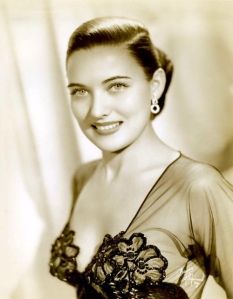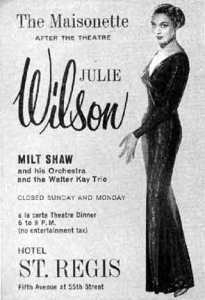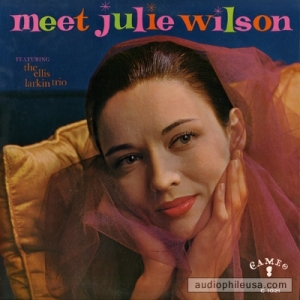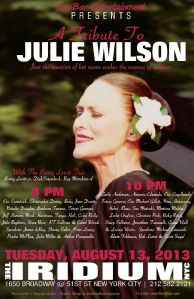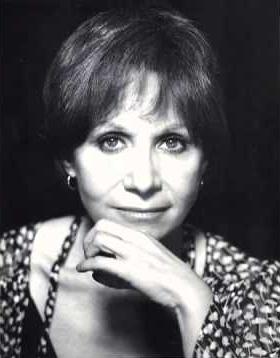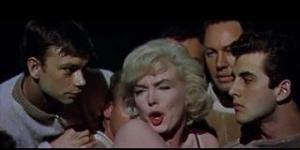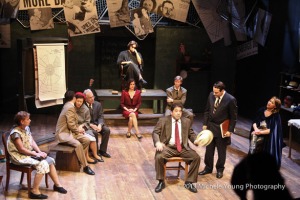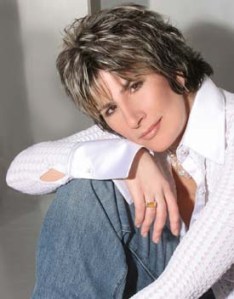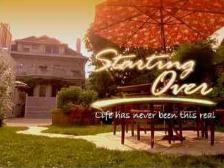 By the earliest part of the century, the producing team of Mary-Ellis Bunim and Jonathan Murray had pioneered a revolutionary new form of televised entertainment, which would become known as the “reality show.” Their initial success came with MTV’s “The Real World,” in which a handful of teenagers and young adults of different backgrounds and geographical foundations would be thrown together to live in a mansion for several months, learning how to get along with each other plus, along the way, lose their prejudices and resentments while coming of age. After several seasons, the two felt confident enough to try a slight variation of the same formula on network television (in this case, NBC), as a daytime show called “Starting Over.” This wasn’t merely “The Real World” for grownups; six women of different ages and circumstances would be brought together to live in a mansion in a Chicago suburb, but this time each had a specific goal for how to start her life over and, through daily sessions with life coaches Rhonda Britten and Rana Walker, would graduate when her goal was fully realized. At that point, another woman would enter the house to take her place and the entire household dynamic would change. Millions of devoted fans were mesmerized daily by the women’s interactions and the exercises employed, and the show ultimately became the first reality show to win an Emmy Award for Outstanding Special Class Series. After the premature passing of Ms. Bunim in January of 2004 at the age of fifty-eight, and the risk of lawsuits because neither life coach was a licensed psychologist, the second season found the show moving to a mansion in the Hollywood Hills and also employing Dr. Stan Katz to give the women more professional guidance. It was at this time that Ms. Walker found herself replaced as a life coach by Iyanla Vanzant, in a move that came as an unpleasant surprise for so many viewers who’d become attached to Rana. The third and final season took place in a mansion in the Southern California enclave of Reseda, and wasn’t renewed, although the show’s online message board remained up and running for a significant amount of time (and often with a great deal of controversy among its members) before NBC/Universal ultimately pulled the plug.
By the earliest part of the century, the producing team of Mary-Ellis Bunim and Jonathan Murray had pioneered a revolutionary new form of televised entertainment, which would become known as the “reality show.” Their initial success came with MTV’s “The Real World,” in which a handful of teenagers and young adults of different backgrounds and geographical foundations would be thrown together to live in a mansion for several months, learning how to get along with each other plus, along the way, lose their prejudices and resentments while coming of age. After several seasons, the two felt confident enough to try a slight variation of the same formula on network television (in this case, NBC), as a daytime show called “Starting Over.” This wasn’t merely “The Real World” for grownups; six women of different ages and circumstances would be brought together to live in a mansion in a Chicago suburb, but this time each had a specific goal for how to start her life over and, through daily sessions with life coaches Rhonda Britten and Rana Walker, would graduate when her goal was fully realized. At that point, another woman would enter the house to take her place and the entire household dynamic would change. Millions of devoted fans were mesmerized daily by the women’s interactions and the exercises employed, and the show ultimately became the first reality show to win an Emmy Award for Outstanding Special Class Series. After the premature passing of Ms. Bunim in January of 2004 at the age of fifty-eight, and the risk of lawsuits because neither life coach was a licensed psychologist, the second season found the show moving to a mansion in the Hollywood Hills and also employing Dr. Stan Katz to give the women more professional guidance. It was at this time that Ms. Walker found herself replaced as a life coach by Iyanla Vanzant, in a move that came as an unpleasant surprise for so many viewers who’d become attached to Rana. The third and final season took place in a mansion in the Southern California enclave of Reseda, and wasn’t renewed, although the show’s online message board remained up and running for a significant amount of time (and often with a great deal of controversy among its members) before NBC/Universal ultimately pulled the plug.
Now, ten years after the program’s debut season, it’s interesting to revisit several notable house guests from that time. In Season One, fans were introduced to (among others) Karen Knox-Cox, a voluptuous blonde from Alabama who had made her living as a designer of costumes for exotic dancers and adult films and was looking to transition into something more mainstream; Teresa Temple Crone of Cincinnati, who was dealing with addictions and debt besides middle-age malaise, and Audrey Tucker, a mixed-race single mom originally from Indianapolis now transplanted to Atlanta to raise her young son, and seeking a career as a singer-songwriter in country music. Season Two found fans greeting Sommer White, a young woman from an affluent suburb of Dallas who had recently undergone gastric bypass surgery; Kim Bookout, a devoted wife and mother of two from a very wealthy marriage in Colorado; Sinae Van Haastert, an eighteen-year-old college senior (yes, really) from Southern California who was coming to grips with legal blindness from an albino-pigmentation difficulty; Arizona native Renee Panis, who came from an extremely dysfunctional family background and dealing with a sexual molestation issue from childhood: Allison Stanley, a former actress from Charlotte, who had just gotten into remission from cancer and dealing with the after-effects of intense chemotherapy and radiation, and Bethany Lynn Marshall of North Carolina, who was coping with amnesiac issues from encephalitis. And Season Three found audiences acquainted with Jill Tracey, a former radio broadcaster who found herself adrift on the rocky shores of personal failure. It should also be noted that Maureen Jacobs Goodman, who was the very first woman to graduate from the house in Season One after making the transition from Chicago bartender to standup comedian, returned briefly to the show in the second season after a tragic house fire, and then in July of 2010 succumbed to a fatal cardiac arrest at the age of sixty-nine while babysitting her youngest granddaughter one night. In any case, The Andrew Martin Report couldn’t be more honored or privileged that they’ve collectively granted us a group interview, to share a glimpse of their lives ten years after the very first episode.
ANDREW MARTIN: How did you first hear about the show? Was it already on the air, were you already a fan, did you just happen to see a casting notice for it, etc?
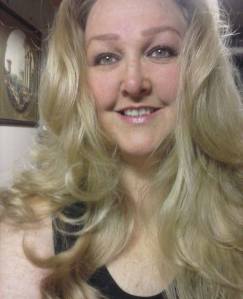
Karen Knox-Cox
KAREN: I was rhinestoning a costume and the TV was on (I always work with the TV on in the background), and a casting call commercial came on. A voice asked, “Do you need to change your life?” I looked up, and answered to the TV, “Yes, I do.” The commercial continued to say, “If so, come to the Wynfrey Hotel, next Tuesday,” between certain hours. It was a very quick and to-the-point commercial. I was watching the midday news, and I guess I just got it on the brain, because the next day I watched the midday news again, but there were no more commercials. That commercial ran again the next Monday, so I called the hotel, and they confirmed that the casting call was on Tuesday. So I made plans to go. I started on my way, and came really close to turning around, telling myself that I was too old to do reality TV. In fact, I actually pulled off onto an exit, but talked myself into following through just to see what it was all about.
TERESA: A good friend of mine, Carolyn, called and said, “Hey, there’s this show I think you would be good on.” She helped me make the tape and send it in. The show hadn’t aired yet.
AUDREY: I was working at a spa. A co-worker heard me singing, and she asked me if I wrote songs? I said yes, and she mentioned there was a casting for a new show that I would be perfect for. Reluctantly, I went. We arrived as they were finishing up for the day and they squeezed me into the last group. I guess I made a good impression. (Laughs)
SOMMER: I was preparing for gastric bypass surgery when auditions for Season Two were announced. I was working as a talent agent and disliked reality TV, because I felt like it was taking jobs from my actors, so when one of the actresses suggested I audition, I was not all that keen. I started DVRing the shows, figuring I’d check them out while I was recovering from surgery, and I’d just see how I felt. By the second episode I was hooked on the show, but still not sure I wanted to be ON it. After two weeks at home, recovering, I’d caught up on all the missed episodes, and was ready to put myself out there and audition. What did I have to lose, and why not take a chance to be a part of something so life-changing?
SINAE: I was already a fan of the show when I heard about the casting call. During college, my mom would tape the Season One episodes, and on the weekends I would watch it. I was really interested in PJ’s story. My mom was the one who heard about the casting call, and it happened to be near my university so we popped in. I really didn’t think anything would come of it, but I was wrong.
BETHANY: After losing my memory in December of 2000, it had taken so much time to adjust. Encephalitis, the infection that had hit my brain, had left me with such severe headaches that it was hard to be up and work for long periods of time, and I had found that watching TV had become one of my favorite pastimes to not only pass the time, but to learn about the world taken from my memory and to also be a pain reliever; it took my mind off the constant nagging headache. I became a HUGE fan of “Days of Our Lives” and “Passions,” mainly because of the never-ending intense story lines, and ESPECIALLY when “Passions” broke up a power couple by means of TOTAL AMNESIA. I felt like I wasn’t alone in the world. I finally had a friend that I might could relate to, someone that might understand me. I had a hard time understanding what part of television was real and what was not at this time, specially because I was an amnesiac. And if you ever saw “Passions,” you know it was crazy! Needless to say, I never missed an episode and watched it to the end every day, so I could have someone to relate to. Well, one day I left the TV running, and heard a girl named PJ talking about how she could not even look in the mirror. She had such a negative self-image that she truly hated herself, didn’t/couldn’t look at herself. Having those exact feelings, I got hooked on the show.
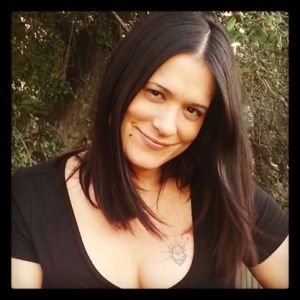
Renee Panis
RENEE: I was a big fan of the first season the show was in Chicago. I had lived there back in 1997, and have always been a fan of the city. I worked mostly nights, so I had my days free. I’m a big reality show junkie, and I became transfixed by all the women’s stories. It was then that I saw on one of the episodes that they would be holding a casting call in Scottsdale, which is twenty minutes from where I was living.
KIM: I was laying in bed with my two daughters and the show came on. It was the end of Season One. My girls were getting close to leaving home for college, and I had lost my identity. I had been a wife and mother for so long that I didn’t know what to do with myself. So I said to my girls, “I should start over.” I know it sounds weird, but I knew I would be on that show. And
on Mothers Day, the girls took me to a casting call here in Denver as a surprise gift.
ALLISON: The show was on air in the second season when I auditioned. I had not seen the show and didn’t know anything about it. I saw an advertisement on TV and I thought, “Why not? What I have got to lose?” I was in the middle of radiation, I was bald, and burnt pretty badly.
JILL: I used to listen to the show on the radio, actually! Our NBC affiliate broadcast on the radio, so after I’d lost my job at the radio station, I was working for one of advertisers who used to book me often, and I would listen to the show. I was really intrigued by Towanda Braxton and Iyanla’s relationship, or lack thereof, and that’s how I got hooked watching it.
AM: What made you think you’d be a proper candidate to apply for the audition/interview process?
ALLISON: I had CANCER! I needed a chance and a prayer to start over. I didn’t know what to expect, and normally I would be too fearful to take the chance. But the advertisement seemed like it was just going to be a great opportunity, and I didn’t want to pass it up.
JILL: Well, my life was a mess. I didn’t recognize it anymore, and I needed help pulling the pieces of me back together. I would listen and watch thinking, if I could just TALK to Iyalna, I bet she could help me get my sh*t together
BETHANY: I had never heard of the show before that moment in Season One. A couple of weeks later I saw that you could send your life story in on a five-minute video for casting, to see if they could help you. So I made a video and sent it in. They called me within a week, and flew me to Los Angeles a week later. It was the first time I had ever been out of my EXTREMELY small town. In my mind, everyone is exactly like me; you can’t remember before age seventeen either. But at the time, I had gone to multiple doctors, been on numerous medicines to stop the pain of the brain infection, nothing had helped, and it only just made me unhealthy and unsure of myself. I was fed up to the point of giving up. I had a family that loved me, but I didn’t love myself and didn’t know how. That was all this show talked about, and I felt like if anyone could teach me how, it was Rhonda.
KIM: I was going to the audition for a different reason than what I was picked for. I thought I would go on to figure out what to do about the empty-nest syndrome, and what my purpose in life was. Because I had seen the show, I thought it would be a good coachable problem, as many women deal with this and it was not talked about a lot.
TERESA: As I said in my initial tape to them, I had all kinds of problems, but my foremost problem was my debt. I had completely breezed through the hefty retirement account that had been part of my divorce settlement, and had maxed out credit cards to boot. I was fifty years old, and in worse shape than I was when I was forty after the divorce. I needed to start over and change my life.
SINAE: I honestly didn’t really think I would be that great of a candidate for the show, but I thought it would be really fun to see the auditions.
RENEE: I was a bartender for ten years, and believe I’m very outgoing and have a spunky attitude. But most important, I wanted to tell my story. I had a very on-again/off-again relationship with my dad. After high school, it just got worse. I knew I had always had issues with abandonment, I could never hold relationships with men, and I had a mother who put my brother on a pedestal my whole life. I always felt like the “black sheep.” So I thought that a lot of women could relate to my story. It wasn’t until later on in the show, that a whole lot more issues arose from the exercises I began doing.
SOMMER: I had no idea if I’d be ‘right’ for the show or not. I only knew that I was so unhappy, and so lost, that I had no choice but to try. And if I was going to try, I had to be willing to put it ALL out there, and I mean everything.
AUDREY: The funny thing is , I never thought I was a good candidate until the process really started rolling. As I began to understand the concept, I figured that it couldn’t hurt anything.
KAREN: Most people I met thought being a costume designer for strippers was interesting. So I thought the show would find it interesting as well. As far as being a proper candidate, well…I had my own self-doubt. I almost didn’t show up there for a moment; I wanted to turn around and go back home. But curiosity prevailed.
AM: What was the audition/interview process like?
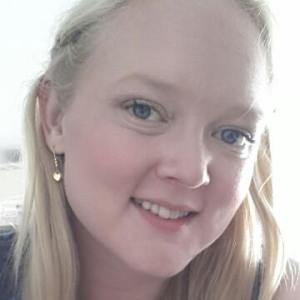
Sinae Van Haastert
SINAE: It was madness! There were so many people in the casting call that it was standing room only. We each filled out some sort of info sheet, and then we got called back in groups to do an interview. We sat in groups and each person discussed their story.
KAREN: We were interviewed in groups of between eight and ten women, sitting around a table. The casting agent, Sara, just spoke to each of us and we had a story. Sara pulled two or three of us into another “classroom,” and asked us to fill out this book-like form. It did take a while to fill out. All of a sudden the double doors flew open, and Sara was scampering toward me. I didn’t look up, but she walked up to my desk, and at that moment I knew two things. I saw her little feet and I knew that a) I was going to be on this show, and b) Sara wore a size four to four-and-a-half shoe, but bought size five shoes because that’s all she could find. She asked me back to be filmed the next day, and the filming was emotional. I cried and was so embarrassed. Sara asked me why I was so emotional, and I told her that I felt like something was happening. She gave me a big hug and assured me that I was right. Something was happening here. The following Wednesday was in Los Angeles, in front of the producers. We were filming, and I shared the story of the casting call, meeting Sara and knowing that I was going to be on that show, and that Sara wore a size four shoe. When those words came out of my mouth, I heard what sounded like metal trash cans being thrown around, with footsteps scampering down a hallway. The doors flew open, and it was Sara saying, “Oh, my God, I have a size four foot and have to buy size five shoes because I can’t find fours anywhere. How do you know that?” I answered, “It’s what I do as a costumer.” I truly believe that shoe incident had something to do with me making it onto the show. It validated me.
RENEE: I remember picking out my most fabulous outfit. I was number one-fifty in line, and. I was shocked by the turnout. You first had to fill out several forms, and write about what brought you to the casting call. They did all the first interviews as a group interview. I was the last to go in my group, and I recall immediately crying once I started talking about my dad. Production then dismissed everyone but stopped me, and asked when could I meet for a second interview and have time to fill out more paperwork. The next day, I met with another producer and sat in a hotel room answering more questions. That was a very rough day for me, because I’m a BIG cryer. The questions were very personal, but at the same she made me feel really comfortable.
AUDREY: The process was long, drawn-out and nerve-wracking. There were lots of videos and questions. Hours of questions. Pictures. Physicals. And flying back and forth from Los Angeles to Atlanta.
ALLISON: When I got to the hotel and saw all the hundreds of women auditioning, I got really scared and almost didn’t go through it. And, I saw a beautiful woman standing up front talking to us about her experience on the show. She sang a country song for us, and had her CD. It was really good, and she relaxed me so much that I bought her CD. It turned out to be Audrey Tucker!! Once I was in the room with others auditioning, I was at ease. I cried with people as they told their stories, and I made them laugh when I told mine. I used humor, and still do, to get through some of the most difficult of times (although now I do that authentically) Still, I felt like the moment I walked in to the room with the other women I was calm, and I felt like it was the most natural thing I have ever done. I believe it was divine intervention; a God thing. I was becoming a tool for God to share my story to others, and I had no idea what that meant.
TERESA: A few weeks after I sent the tape, I received a call from Bunim-Murray that they wanted me to attend a live casting call in Indianapolis, about ninety miles away from Cincinnati. I drove there and went in with all the others to the first interview. They asked me to come back the next day (Sunday), and they did a recording. It just proceeded from there. It is a very extensive process. Flight to Los Angeles, medical and mental assessments, the whole deal, before you are told you have been accepted to the show.
SOMMER: At first it was nerve-wracking, but fun. I made a few friends, and one of them even made callbacks with me the next day. It was kind of ‘us against them’ for about five minutes. Then it got real. It was scary to be so honest about my life, but on some level, it was my first step in the process. It was freeing.
JILL: LONG!!! Oh, my God, it went on for months! I went to the interview in April, and I didn’t walk into the house until August. I quit my job in May, and didn’t want to start another and have to leave it in less than ninety days, because somehow I KNEW I was gonna get this shot. I knew it.
KIM: I had never been to an audition, so for me it was exciting. However, it was a lot of work and stressful. There was all the paperwork, a lot of questions, and a lot of interviews. It was a process of elimination, and as the hours went by, the process was harder and the women in the group became smaller. I was there from seven until nine PM. They told me if I didn’t hear from them that night, I didn’t make it. I didn’t even get down the elevator and they called and said I made it.
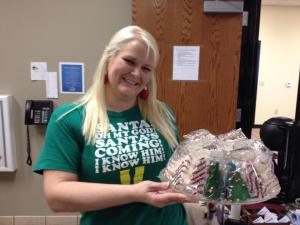
Bethany Lynn Marshall
BETHANY: It was a TON of questions and a HUGE contract. It was so awesome to fly to LA. I had never (in my working memory) flown before. They picked me up in a limo with a driver holding my name at the airport. I felt so important! They asked a billion questions, and asked them again. Then they sent me a contract that was between sixty and seventy pages long, which signed away every right I think I ever had. And the next thing I knew, I was in Los Angeles walking up to the house.
AM: What was your reaction when you learned you’d been cast on the show?
TERESA: I was elated. I was just excited to be part of something new like the show as a chance to change my life, working with real professionals. I felt like it was going to be like “The Real World” with other women who had goals.
RENEE: I was opening the bar and setting up for the night. I was actually watching the new season of the show while I was working, and I had thought that I wasn’t going to be cast because the season had already started. But when I saw a California area code on my phone, it sent chills down my back. I screamed and yelled, and started crying, of course. I immediately sat down with my proprietor and asked him if I could take a leave of absence. We were very close, he knew how much I loved the show, and he was aware of me applying. He said of course, and wished me the best of luck.
KIM: I was really excited and happy, yet scared and nervous about putting my life out there for the world to see. I was also worried about being on TV and how it would change my life; leaving my home, husband, kids, friends etc.
KAREN: As I’ve said, I really felt I’d be chosen. I just felt it, from the beginning. And I was happy and scared, and sad and curious, all at the same time. I was ready, and open for some kind of change.
SINAE: I was a little bit mortified when I heard that I was going to be a cast member. When I got the call, it had only been a few days since the casting session. I had to go into the Bunim-Murray studio twice after I got the call to do on-camera interviews. In the second interview, they asked if my mother could also be a cast member, but she declined the offer.
ALLISON: I was excited and nervous. During this entire process, I kept forgetting how really sick I was. I think the first real thing I had to deal with was to see if my doctors would release me and let me go out to the West Coast to film. Once I got the clearance, it just fell into place. I didn’t really know how to feel, because everything in my life was already turned upside since I was told I had cancer. It was surreal from that moment to the audition. and as I boarded the plane for Hollywood.
AUDREY: I was out when I received the call from the producer, but her message told me that they loved me and wanted me to take part. It was very exciting but also scary, because I don’t think any of us really knew what we were signing up for.
BETHANY: FEAR. Everything happened so fast. Even though it was between four and six weeks before I got the official call, I NEVER thought they would pick me to be on a TV show. And I thought it would be shot in Chicago, like Season One. I could NOT believe I was going to be living in the Hollywood Hills, and I was so scared to live on the other side of the country from my parents. WHAT IF I LOST MY MEMORY AGAIN while I was out there? I would never be found, or find my way back to the people that had taken care of my for the past three-and-a-half years. I was petrified, but had pushed it this far and knew I had to see it through.
JILL: Hallelujah!!! I was sooooo ready to go. I just felt like this really was the beginning of turning my life around in a direction I would pursue the rest of my life.
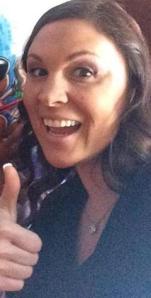
Sommer White
SOMMER: My VERY FIRST thought was “Oh, f*ck! What am I going to tell my boss?’” (Laughs) She wasn’t a fan of reality TV either. I think that thought came first because there was never a question of whether I’d take the opportunity or not. There was no choice for me; that was my path. I just needed to know if I had a paycheck to come back to.
AM: How difficult was it to pack up and relocate to the house?
SINAE: Well, Season Two was filmed in Southern California, and I’m a Southern Cali native, so it wasn’t a big deal for me to pack up and leave for the house. We did have some restrictions on what we could and couldn’t wear (no logos and no stripes), so before I left for the show I had to get all new shirts.
SOMMER: TEARS! So many tears! I don’t know why; I knew I was going to eventually be coming home, but I guess it was just scary to think of leaving my comfort zone to go across country and get uncomfortable. On TV. With strangers. Big time nerves! I was also so excited and hopeful, though. I just knew I was stepping into the next phase of my life, and that is pretty cool knowledge to have.
AUDREY: Moving was very difficult. I had a young son, so arrangements had to be made. I also packed so many things that I shipped luggage. But I didn’t have any trouble acclimating to the house. I slept well, and felt relaxed.
RENEE: It was NOT hard to pack up and leave!! The only thing I was worried about was how many clothes to bring!!!
KIM: I was scared! I didn’t know what this was going to look like, where we were staying and with whom. But I was also excited about having a new adventure!
TERESA: Well, at the time I was pretty broke, so my dad, who was still alive and living on the family farm, sold some of his Angus cattle from the herd, and that gave me the chance to pre-pay my bills for when I would be gone. My youngest daughter was eighteen and had a boyfriend (now her husband), and he was with her, so she wouldn’t be scared living alone in the house we rented in Indian Hill from Marge Schott, who owned the Cincinnati Reds at the time. It was a tiny place, and very secluded. I had kept lots of stuff from my former married life, in a place four times the size of that house, and I had a real clutter problem. I could have been on the show just for that problem, really. I was a real hoarder. I have reformed now, thank God.
JILL: I had been packing really since May, so I was pretty ready to go once I got the word.
ALLISON: It was not difficult, because I had no expectations. I hadn’t really seen the show, and everything in my life was pretty unreal, as my thirty-something life was suddenly changed when I lost my left breast and spent my days receiving chemo, and having needles stuck in me daily. Coming into the house seemed like a piece of cake.
KAREN: Difficult? It took me sixteen days to move across the country. And I’d do it again anytime!
AM: How soon did you find yourself assimilating with your other house mates? And once you had already been a house mate for some time, how awkward was it when somebody new came in to take her place?
AUDREY: Well, I am and always have been a social butterfly, and I didn’t feel any tension from the others unless it was forced. I don’t have problems getting along with people, all types of people, so I hated that the show didn’t really want to capitalize on that. They would’ve preferred everyone to be at odds to create this drama that people couldn’t wait to watch. I felt like it was always the one with open arms for any newbies as well. I didn’t want anyone to feel weird or uncomfortable.
TERESA: I immediately loved my housemates. Andy Paige was the first person who stood out to me. She was so beautiful! I found her very sweet. The first day was awkward, as it seemed they were all so situated and comfortable, and when I entered the house and there were all those camera people and microphone people, and it felt funny. It soon became common, and you forgot they were there sometimes. That is a faux-pas, because you can surely do and say things you don’t think about until later.
BETHANY: I used to be very quiet and not talk very much (which is hilarious, since that’s all I do now). With each roommate that entered the house I learned something new, and they all taught me to speak up if you wanted to be heard. And that I had a story, a cool one at that. Before, I had only seen myself as someone with no past, nothing to talk about and therefore a nobody. Why would anyone new want to interact with me? I stayed quiet and watched everyone else. These ladies taught me how to interact with people from all over the United States, with movie/soap stars, musicians and more.
ALLISON: I loved the women in the house. I was one of the last women to come onto the show, in the second season. I was new, and replaced a very well-liked gal (Renee). All I knew was I came in wearing a red hat with red lipstick and a red blouse. It was bold and I got behind the mask of RED as long as I could. Still, the women were warm, supportive and funny.
RENEE: It didn’t take long to adapt to the cameras. Getting de-miked every time you had to go to the bathroom was kind of annoying, and you couldn’t talk without a mike, so that was frustrating. It felt good not to be the new kid once a new houseguest arrived, and it was always heartfelt to hear about another woman’s story. We were a family, so it was like getting a new family member every time.

Kim Bookout
KIM: I think it was easier to be the first ones in the house, in Season Two. We all bonded quickly, because we were all in the same boat except for me and Deborah. But honestly, I hated when new people came in as it always created drama. However, it did also support me in change and growth. I also hated when people left.
JILL: Jessica and I hit it off immediately, and I hit it off with Allison as well. Lisa, TJ and Christina took a little longer, but TJ was my greatest challenge. And our friendship helped me grow the most for sure.
SOMMER: Oh, man. I’m not sure anyone else took as long as I did to make allies. I have never watched but a few of the shows once I was on, so I’m not sure how long it took the other women, but I feel like all my original house mates basically hated me for a long time. Sinae and Jenn were the first to come around, albeit cautiously. Then Mo (Maureen) came to join us and things really changed for me. Aside from the fact that I felt like I already knew her; she already knew what we were going through, and how we would come out on the other side. She saw my pain, and helped me understand it, and understand why everyone was reacting the way they were. I will never forget that kindness. As for how I reacted when someone new came in…well, after my experience, I wasn’t about to be a jerk to them, or even stand-offish. It wasn’t in my nature in the first place. I can’t say I was close with every one of them, but I gave them all a fair shake.
SINAE: It wasn’t really hard to get into the groove of the house. I was blessed to get a great roommate which made things much easier. The only person who left the house before me was Deborah, and it wasn’t awkward when she left. When Deborah left the house we were all pretty bummed that she had given up on her journey, but because of tension that had arisen during her stay, we were also relieved. After she left we spent the day at a paintball range getting out some of our frustrations. The show didn’t air our wild day of paintball and I wish they had, because it was one of my most memorable moments in the house. You should ask the other ladies about that day!!
AM: Without naming names (unless you’re comfortable with that), were you particularly happy with your roommate(s)? Why or why not?
SOMMER: Boy, Andrew, you just WANT to stir some old stuff back up, don’t you? (Laughs) Well, first there was Kimmie. Since no one in the house liked me at first, lets just say we didn’t see eye to eye. We were all learning to be true to ourselves, and leave old behaviors behind, and now I can see that both of us were just practicing that on each other, and since we weren’t very good at it, we struggled. We just had a nice long chat on Facebook this past February, and I can say that it’s likely the first genuine conversation we’ve ever had, and I really enjoyed it. All of our other interactions were colored by what was happening in the house, or what we felt was done to us in the house, so there was always an edge. That’s gone now, and I hope one day we get to sit and chat in person again. She always did crack me up. Then came Nay (Renee), and in her I found a sister. Jenn was the first sister I found in the house, but it was an entirely different relationship when the person you shared a room with was like your twin in so many ways. I continue to adore her today, and hate that we haven’t seen each other much in recent years. We sure knew how to find trouble in the house, and that talent did not fade as we had adventures after graduation. The night of the supposed ‘break-in,’ she and I were out on our patio after the crew had left us, hollering and tossing some kind of fruit or something from the tree by our room, down to the neighbors in the house way below us, who were having a party. They kept trying to get us to climb over the fence and come down, which we wouldn’t have dared to, but to this day, I still think that neighbor was Leonardo DiCaprio, and that was quite tempting, as I’m sure you can imagine. Don’t ask me why I thought that. With the kinds of neighbors we had, I may have just figured, why not? (Laughs).
KIM: It’s no surprise that Deborah was my first roommate, and we did not exactly bond. She told me she sleeps naked and snores, so get over it and deal. I was frankly scared of her, and did not want to see her sleeping naked next to me. (Laughs) I was very uncomfortable. She used my things without asking, and we were in a small room with twin beds.
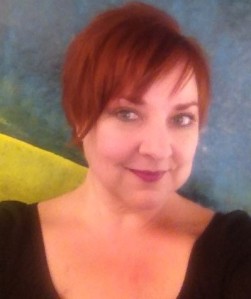
Allison Stanley
ALLISON: I was lucky enough to have three roommates/sisters during my time on the show. The first was Bethany. Who would have thought that two women from the same state, living thirty-five miles from one another, would end up being best friends? Bethany and I had some similarities but we were very different. She always said she was the country version of North Carolina and I was the city version. The producers tried to pin each of us against the other; they knew she was sad that Renee had left, and everyone kept telling me how Bethany didn’t want me as a roommate. That first night, when the lights were out, she whispered to me, “They want us to not like each other. That’s not going to happen.” I whispered back, “You’re right about that!” I went to bed with a smile on my face and relaxed to know I met a true friend. The next roommate was Layne. She was so good to me, and was my caretaker. Iyanla said her role was my midwife. Layne is a beautiful soul inside and out; she took her job caring for me seriously, and I will never forget her for it. I needed her much more than she needed me. We kept up for a while after we left the house, but I fell short on our friendship. I think that I was honestly fighting for my life, and didn’t have the capacity to take on a lot. I hope she is happy; she deserves it and is lovely person. My last roommate, on Season Three, was Lisa. She was not a fan favorite, as many people could not identify with the fact that she was given many things in her life and didn’t have to work very hard. And she was forty years old and did not know how to grow up. I found her to be a raw, pure being, who was willing to do and try anything for the greater good, and I loved her. She worked really hard, and made great strides during her time in the house. She was eccentric, and good to me. I learned a lot from her and how she blended into the sisterhood
AUDREY: As I stated earlier, I typically get along with anybody and everybody, so when this fake drama came up between me and Karen, it kind of threw me for a loop. I was confused and slow to learn that it was being orchestrated to create must-watch television. If we knew then what we know now, I could’ve given them one hell of a show. Like many other reality shows, they love drama. I tried just to be real the only me I know how to be.
BETHANY: My two roommates were Renee and Allison. Even though when we aired with editing, and all the fun TV magic while we were on air for months, I actually only lived out there for eight or nine weeks. Renee was my first roommate, and even though it took me some time to open up, I would say she was probably my first best friend/person I ever learned to trust outside of my own family. I came to love her like my own sister. Five weeks later, when she was taken from me, “earned her wings and graduated,” I was devastated. It did not matter who they brought in the house, because I was not going to like them. In walks Allison from Charlotte! North Carolina!! Forty-five minutes from my own home!! Even the producers, when they took me into the confessional for the first few days after Renee’s departure, would prompt me to say things beginning with, “Renee is gone and even though Allison is here I….” and leave that ominous sentence for me to start and finish. However, mine and Allison’s smart, fun-loving Southern charm saw through the game, and in a matter of days we bonded. And we are still best friends today.
KAREN: My roommate was Teresa.. I loved her then, and I love her now! We keep saying we’re going to plan a trip to Florida together…maybe we’ll get it together one day! I felt close to most everyone in the house, even the ones that production pitted against each other.
TERESA: My first roommate was Kimberlyn, and I really liked her. I felt badly when she got kicked out of the house. Then next was Karen, of course, who is my homie, and I love her dearly.
JILL: Jodi and I have had the longest friendship. Jessica and I are still great friends, but we surely don’t see each other as often as we’d like. The passing of Kim was very difficult, because she and I didn’t get along AT ALL, and I knew she was really damaged. Clearly the show was her last attempt to get help
SINAE: I enjoyed all of my house mates for what they had to offer. Each of my house mates holds a special place in my heart, and we will forever share our experience of living together on the show. Not all the times were great, but for the most part we had a terrific era with each other. I had a great time getting my nails done with Towanda, shopping with Jennifer, eating with Kim, playing cards with Sommer, bonding with little Chloe, and hanging out in the hot tub with Josie.
RENEE: Sommer and I had an instant connection. We both had worked for Outback Steakhouse, and could finish each other’s sentences. We had to have been sisters in another life. I have never met anyone like Sommer. Her outlook on life really made me think about what I was capable of. I think our connection may have got us into trouble from time to time, but after the show I would visit her in San Diego, and she was my date for my brother’s wedding. When Sommer left, God graced me with an angel. Bethany was a breath of fresh air. Her Southern accent is what got me. I’m a sucker for an accent! She was the little sister I never had. She was so young, and came from another place and family that you only read about in books and or see in a movie. She taught me a lot about just living and being THANKFUL for what I have. Her story alone is so intriguing; you always wanted to know more.
AM: What would you say was your favorite or easiest exercise, either individually or as a group?
KIM: On one of the first days we were there, Iyanla took us to a park and asked us to write down one thing we wanted, on a small sailboat. I wrote, “joy.” She asked us to put our boat in a small lake (the point of the exercise being that what you put out in the universe will come back), mine top-sized, and Jennifer went in the water to turn my boat back over. Iyanla stopped her and asked me, “Why are you allowing someone else to be in charge of your joy?” She made me go back in and handle my own life. It was an “a-ha” moment for me.
ALLISON: I had a great really easy day palling around with Candy, as she was given a day of beauty. I got to share with her as she got a makeover, and we got to do a bunch of “girly stuff.” That was right up my alley, and she hadn’t experienced much of it. It was easy for me, and I had so much fun. Not to mention I got to reap some of the benefits; I got a whole new make-up line that day!
BETHANY: I had two favorites. One was being dropped off in the middle of LA and being told to find my way back to the house on my third day, with no knowledge of what a taxi or a bus or any city amenity was or how to use it. AND IT DIDN’T EVEN AIR!! (Laughs) Cassie cried that day because she was so worried about me getting home. I love her. But I digress. My other favorite was when Vanessa and I had our Rebel Day. Vanessa had grown up with such a strict training regimen in gymnastics that having fun, or doing something against her parents’ wishes, had never been an option. If I had ever rebelled, I didn’t remember it, and I sure hadn’t thought to do anything left of center since I had lost my memory. We got tattoos (fake, of course, although I have real ones now because of this day), and we wore leather. We rode Harleys all day, and played pool with bikers. I LOVED IT, and it let me know that rebelling doesn’t mean being bad; it showed me that I can break the mold. I don’t have to be a certain way all the time. I can dress how I want and be who I want to be. I can wear my five-inch heels with a Dallas Cowboys jersey anytime I want. I’ve even worked for CrossRoads Harley-Davidson in Wilkesboro for the past three years. That exercise still lives with me today.
KAREN: Love, love, loved ALL of them!!! I mean that, loved all of them. Each one was a challenge, and I tried my best, with each and every one.
SINAE: I think my favorite exercise was learning how to use a taxi. If I had never learned to use a taxi, I would still be dependent on other people for transportation. Now that I live in Bangkok, I use a taxi every single day.
TERESA: I guess I would have to say our Halloween party. It was pure fun!
RENEE: For me this is hard to say, because there were so many. The one that hits closest to home was volunteering at the Ronald McDonald House. I never knew much about it, but seeing the children and their families was heart-wrenching. Even though these kids were facing a terminal illness, they all seemed so happy and hopeful about life. It made you think that you should not take life for granted. We made cookies together, and played basketball. I got to meet the parents, and we’re so thankful for help that the Ronald McDonald house provides.
SOMMER: The first one that comes to mind for me is the Def Poetry Jam night. The night was a success, and it felt like we were a family, all laughing and enjoying each other. That was a great exercise.
JILL: Easiest and fun was probably was when I was tied to TJ and had to go to the hookah bar. And when Jodi and I went to the bar to find dates.
AUDREY: My favorite would’ve been singing in the subway, or on the corner for strangers. I still approach my music without any fear. I also loved the day at the radio station. What a joy to say I have done that!
AM: What would you say was your least favorite or most difficult exercise, either individually or as a group?
KAREN: My least favorite, I would have to say, was the “letting go of the balloons,” to let go of the issues between my mother and me. It did not work!!! We still have no relationship. But I was able to let her go, when she didn’t even give me a phone call after my husband Bill passed away. Now, that action, or lack of action, spoke volumes to me.
KIM: I actually had two least favorite. One was having to wear sweats on Melrose Avenue with no makeup or jewelry on, and having to walk up to complete strangers and tell them all the things I had done in my life that I judged as being bad or wrong. I was terrified and didn’t want to do it. The other was meeting with my sister. (Laughs)
JILL: My most difficult was my baggage, which led up to Mabel. That was life-changing for me.
ALLISON: The hardest thing I had to do was clean up the refrigerator on Season Three. Iyanla made me clean it spotless, and I took great pride in it. Once I showed it off, we went to another location to discuss the process. When I came back and passed by the fridge, it was dirtier than before. Vile and filled with rotten molded items. I immediately started cleaning it again. Iyalna got in my face and yelled, “WHEN ARE YOU GOING TO STOP CLEANING UP EVERYONE’S MESSES??” I was paralyzed. She stayed in my face until I SHOVED her away. Yes, ladies and gentlemen, I SHOVED IYANLA VANZANT. Trust me, it was not a comfortable situation. But it was one that changed my life!
RENEE: I had two also. One was the day Iyanla put me in a giant-sized birdcage. I sat in that cage for like five hours. I couldn’t leave, and I had to ring a bell for a house mate to bring me food or take me to the bathroom! I’m still having flashbacks about it today!! I also hated walking around Hollywood and Highland with a sandwich board around my neck in front of the Jimmy Kimmel show! That was embarrassing!!!
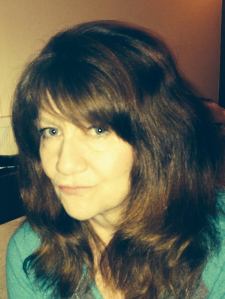
Teresa Temple Crone
TERESA: It was Bulldog Boot Camp. I was NOT in shape. I weighed one-hundred-eighty-five pounds when I went on the show. Ten weeks later, I weighed one-sixty-five. That’s how active we were. Plus, I think the stress of being always ‘on’ can take off the pounds. I ate better, too
SOMMER: Seriously, I don’t think I can pick one. Having to introduce myself and tell my story, drawing a picture of myself on the wall, screaming into the canyon just to prove I could do it for myself, our trip to the beach as a group, the scarlet letter exercise…they were all hard. That’s why we had to do them. I can’t pick just one.
SINAE: Oh, my God. Hands down the worst exercise for me was when we had to paint all our mistakes on our bodies at the beach. First of all, I hate the beach. Second, I was mortified to admit to all the horrible things I had done in my life up to that point.
AUDREY: Hmmmm. Least favorite would be to entrust someone else to set a budget for an outfit to perform in, and then trust them to either make it or put it together. Who does that? I knew how I wanted to look, and didn’t feel like the person assigned to help me had the expertise to style me the way I preferred. Needless to say, I chose an outfit that I brought from home. Oh, well, fire me!!
BETHANY: The first was anything involving dancing. I’m a terrible dancer, and having to dance on national television was truly a “greatest fear” kind of thing for me. The other was the day they were trying to help Candy and me with how we saw ourselves, and stripped us out of all our clothes and forced us to try on lingerie. I am not a lingerie model, but my big butt has now been seen on national TV in a bra and lingerie. I got nothing out of that exercise, because all I could see were the cameras staring at me.
AM: Were you ever surprised by how lengthy (or how quickly) it took you to reach your graduation process? Why?
JILL: Lord, it took me the longest EVER (well, next to Allison) to get to graduation. (Laughs) I mean, they had to go get Della Reese to be my judge, and take me to court to get me to graduation!!
AUDREY: No. You pretty much know how you are doing throughout the entire process. As long as you are making progress, you can pretty much tell if you were going to graduate or not.
KAREN: I lived in the house for three months. At first I had no idea it could be that long. Then I liked the idea of living in a mansion just off the lake in Chicago. Then I got a little bored with it, and wanted to go. And in the last few moments, saying good-bye, knowing you have to leave the house, and production “un-microphoning” you, that was sad. So sad, and I wanted it back. We all know that without a microphone, we’re not a star. It was nice being a star, if only for three months.
KIM: I thought because of my issues I would be on for a while. I did not think I would ever be able to mend the relationship with my sister, so I was actually surprised I graduated sooner than I thought I would.
TERESA: I was surprised it took so long, but it seemed like my problems were difficult on many levels to resolve. How do you get rid of thousands of dollars of debt in a short time? Steve Rhode was my money coach, and in the end I met with Dave Ramsey to set up a payment plan.
BETHANY: It was hard to keep up with time while in the house. I entered sometime in October, went home for Thanksgiving, came back and finished filming. Talk about REALLY messing with my head. We were in the swimming pool the day before Thanksgiving in seventy-degree weather, with no leaves changing in LA. I flew out that evening, landed in home in forty-degree freezing cold wind and rain, and beautiful fall foliage everywhere. I had no clue how long I had been gone. It seemed like years at that point. When I graduated and went home, I felt like I had just started. The process was grueling. My daily headaches and migraines react to stress, and my body felt like I had been beaten when I got home and truly realized everything I had been through, in the short amount of time I had accomplished it in.
RENEE: I had just gotten back from being home for Thanksgiving. I had re-packed all my stuff and literally two days later, I graduated. I felt ready, but at the same time, you adjust to this life and you don’t want to go home. But at the same time, you want to use the tools and skills you just learned, and use them in the real world.
SINAE: I really gave every exercise a hundred percent, so I am not surprised that I graduated first in Season Two.
ALLISON: Well, again, I graduated twice! I think the first season I was on, I was merely just truly there to survive, and I didn’t know that until a couple of years after. The second season and I was a few weeks out of serious surgery; I had a right mastectomy, full-cut hysterectomy and tram-flap reconstruction surgery on both my breasts. I was not healed well when I returned. I was tired and weak. The good part about that was I was vulnerable enough to remove the mask, and get to know truly how to be vulnerable. But the bad part of that was I was no longer the “little darling” of the show. I was vulnerable, and I had a tough time pulling through. The coaches tried everything to get me to see my strong, capable, authentic self. It took much longer than anyone expected, but I got there. I graduated.
AM: What were the most positive lessons you took away from the house when you returned home?
SOMMER: For me, there were three. First, Iyanla telling us that people come into our lives for a reason, a season, or a lifetime. And that none were more or less important than the others. She wanted us to realize that we shouldn’t be angry at people when they move on, it’s part of the life cycle, and it makes room for new people to come in. Second was Rhonda’s lesson that every decision we make is truly a choice. Even when we don’t feel like there are options, there are, and you must take control and choose. And then, own your choice. And third is to be true to yourself. You are the only person who has to live with you, and being comfortable with who you are, the decisions you’ve made, and the results of those decisions, is SO FREEING. I learned that one after getting kicked off the show in Season Two, before I returned to graduate in Season Three. So many people were so full of opinions about my choices and my life, and frankly, how much I sucked. I had to learn that I am who I am, and those people don’t actually KNOW who that is, so I can’t get upset about their statements or reactions. That led me to realizing that I’d been living a half-truth with those close to me too, pretending I was OK when I wasn’t, or going along with the group even if I didn’t feel like it. So I stepped into my truth with them also, and next thing you know, the people who were left were the ones who were genuine, and I understood what it felt like to be really loved for myself. I just couldn’t see that until I was first able to love myself enough to share that girl with the rest of the world.
BETHANY: I also have three, but I put them in terms of past, present and future. The past is that I didn’t lose my memory. It was taken from me. It was not my fault or my doing. I cannot control what a viral infection like encephalitis does to my brain, but I CAN pick up, shake off and truck on from here. The present is that if I don’t love myself and take care of myself first, I can’t ever show love to someone else, or truly smile from a place of complete happiness inside myself. I learned to look at myself in a mirror, and love that person. If I’m going to live everyday like I may not have a memory tomorrow anyway, then why not take risks and enjoy life? And for future, you don’t go to school because you know everything; you go to school to learn everything. These three things are what I live by, and truly were my post-show accomplishments of which I am the most proud to have come from!
RENEE: I’d say that just being in a relationship with my father again meant the world to me. I was a better listener, and for the first time in a long time, I had goals again. I applied to the Art Institute of Phoenix, and finally felt that I could succeed in a scholastic way.
KIM: I am the captain of my own life, and I can manifest and create the life I desire. I am a powerful manifester, and can tap into the universe and create the life my soul intended If you don’t like what you are doing, you can make another choice. I am powerful and do not have to live in fear. I can start over any time I choose. I let my past go, forgave myself, and live in the moment.
JILL: Wow. The egg timer, which helped me learn to pause and think fully before I speak. The obstacle course, where I did the same thing I always did; take a shortcut. And Mabel of course, too .
ALLISON: Life is precious. You MUST live every day in the present. Being authentic will pull you forward. Learning not to judge anyone was another top gift. As Ms. Iyanla said, and I quote her all the time, I am not my brother’s keeper; I am my brother. So true!
TERESA: The power of female friends, and their effect on your life. I found out how impactual a group of strong and loving women can be. I still have not been able to recreate it fully in my own life today.
KAREN: By far, the most positive lesson learned was to dream. Our dreams, our desires, our underlying goals, should be taken seriously and we should go after them, every time an opportunity comes our way. No matter how old we are, and no matter, how many times we’ve tried in the past. Dreams keep us alive and makes us human; it makes each of us our own unique human being.

Audrey Tucker
AUDREY: Well, I learned that faith without work is numbness. You have to move your feet or lose your seat. I would’ve sat on this forever if I hadn’t been forced to share it with the world. I still have much more to offer, and I will never stop writing music
SINAE: I think it is easy to say that the best thing I learned while being on the show was to be independent. But in retrospect, independence wasn’t the most important lesson I learned. The most important thing I took away from the house was knowing that every human is broken in some way. We are all damaged goods. No matter how broken and damaged we are physically or emotionally, we still have the capacity to love and be loved
AM: What were the most negative lessons you took away from the house when you returned home?
TERESA: Without going into detail, don’t ever get drunk on a reality show.
SINAE: I don’t think I learned any negative lessons from the house. There were things said in the house at times that I have replayed in my head from time to time, or seen when people have posted an episode online, and those things have affected me negatively. It is hard to have something said about you and for that thing to be public. The things that were said and done on the show aren’t just public, but they are more or less set in stone, because the episodes are replayed around the world, posted on forums, uploaded on YouTube, and chatted about on message boards.
ALLISON: Well, it was very hard to go from being the darling to being thought of as a fraud. Viewers and sisters had a hard time with me being so sweet and thought it was fake. But it wasn’t. I was just unaware of how to be “present.”
RENEE: Nothing really. It was hard to see the episode where I admitted to being molested. You wonder what people there think about you, but so many other’s went through what I went through.
SOMMER: There is no such thing as a negative lesson. That’s actually entirely what the house was about. Had you asked me in the first few weeks, and even maybe months after I was kicked off of Season Two, I might have had a different answer. But as time went on, I realized that everything that happened occurred for a reason. And I learned and changed because of it. I wouldn’t change a thing.
KIM: You have to remember that this was one of the very first reality shows. They did not have any after-care, and did not tell us what it would be like to come out of the house. The message boards were brutal and very mean!! Yet, when I went in public, people ran up to me wanting autographs and pictures. It was very confusing, and I am sure people on reality shows now are more prepared, or at least know what to expect.
KAREN: I have only one negative feeling about the experience. The show won an Emmy in Season One, and if production and the life coaches deserved an Emmy, then so do the members of the cast. The show was not about life coaches; it was about women making changes with the help of life coaches. And if the life coaches deserve an Emmy, then so do the cast members. I truly believe we deserve our Emmys!
BETHANY: I learned to never trust a producer! (Laughs) I learned that everything on TV is edited. This little country-bumpkin didn’t understand that when she went to the big city. The nine weeks I lived in LA were the greatest of my life. I learned more than I could ever express. But the five months I was airing on TV and watching how dramatic everything was, and what they did and didn’t show, all while reading the online message boards, were the worst months of my life. I almost reverted back to the low self-esteem and sadness that preceded the show. All of that was part of the growing process. It made me stronger emotionally. My dad has a Master’s in Counseling, and I had him to help me make it through. If you saw the show, then you know. It should have been me helping him. They made him look terrible, and I think that is what hurt me the most. This was the man that had done nothing but get me help when I was literally lost the day my memory left; the man that had done nothing but support me and guide me back to health. He was the one person the show chose to tear apart because, at least it seemed to me, he is a Southern Baptist minister, and dramatizing him that way made for a good storyline. He never worried about, or harbored, hard feelings. I did, until he helped me see that the only person it was hurting was me.
AUDREY: Oh, where to begin? Don’t trust television. Really, don’t. Don’t read message boards or blogs either. It was sad, yet enlightening. I hated that things were staged, and manipulated to make people act certain ways. I know my spirit, and hated that they could try and alter that by making us act and react to certain situations. But I met some wonderful people, and I will always remember the entire experience.
JILL: I can’t say there were any I didn’t learn.
AM: Where has life taken you today?
ALLISON: I am well! I am ten years cancer-free. I am working for a production agency as an event producer, and I get to travel and work on some really fun events.
RENEE: Today I’m living in California, a place where I always wanted to live. I’m close with my brother, sister-in-law and nieces. I’m a supervisor with H&M in Orange County. I was diagnosed with breast cancer in ‘08, and in August of ‘13 went into remission. Life has thrown me MANY curve balls since the show, but I still use the tools and skills and reach out to my friends, family, and fellow cast mates for anything and everything.
KIM: I had hoped if I helped one person, it would be worth it. I am now a minister and life coach. I have a coaching and ministry business called Majestic Ministries and Coaching. I now support others to step into their majesty. I work with a church, lead spiritual workshops, and speak to others in a small group setting and lead retreats. I am still getting along with my sister, and while it hasn’t always been easy, we both are dedicated to our relationship. And I’m in the process of writing a book, which will be coming out at the end of the summer.
TERESA: Thanks to the direction of my life coach Rana Walker, I barely salvaged my LSW (I had to take continuing education while on the show, just to make the deadline to renew my Social Work license). I was able to then take the exam for Licensed Independent Social Worker, since I have a Master’s Degree. I was able to do a lot of contract work then, which worked with my crazy schedule at the time. I had a lot of interesting experiences with clients.
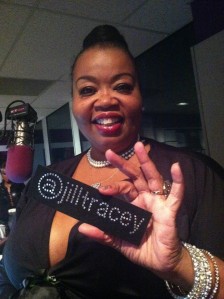
Jill Tracey
JILL: Wow. Everywhere and back to one. I lived in Los Angeles for awhile, then Atlanta, and now I’m back in Miami. My mom got sick, so I came back to care for her, and now she’s in an assisted-living place and doing well. I am back on the air at the same station where I started on FM, Hot105fm.com, and I’m living with my two lovely furkids; Princess, my mini schnauzer who is now six, and Lola Duberry, a Pitbull/Dachshund mix I rescued last year who is two. I host “Love, Life and the 411” on the radio, and I write a column for Miami.com, I’m working on a new show called “What Women Want!” and I host and produce events under the “Jill Tracey Presents” moniker. And I am slowly starting a lovely floral business called Miss Tracey’s Fabulous Flowers. You know I stay busy!
AUDREY: I am a recent affiliate with SESAC as a publisher and a writer. It is exciting, and this is an invite-only organization, so I am honored to be a part of their organization. Good things will come from this
BETHANY: Before the show, I worked at Iredell Memorial Hospital in Statesville, NC. That was it. Since then, I put the advice into action, and this amnesiac took every kind of class possible at the University of North Carolina at Greensboro. And ended up speaking on my graduation day as a featured speaker. I graduated without remembering a day of elementary, middle or high school. I worked thirty-five or forty hours a week while in college, and was in an honors fraternity, Phi Sigma Pi, where I made a lot of amazing friends that I still have today. After being a nanny of four beautiful Deslauriers kids for a couple years, Allison (my roomy from the show) helped me get a job with one of her friends in Greensboro at RLF Communications, working in Public Relations. I fell in love with it! Monty Hagler helped me realize my passion. I had never in all my life known that work could be fun. I had only ever just worked to work and pay the bills. I started learning everything I could about marketing and public relations. Not long after graduation, I found my calling as the Director of a program called First In Families, that worked with individuals with developmental disabilities and traumatic brain injuries, that needed help getting their name out and letting people know they were there through Barium Springs Home for Children, all the while continuing my marketing, sales and public relations by joining up with CrossRoads Harley-Davidson in Wilkesboro, NC. Talk about FUN!! There was NOTHING boring about this job!! Riding Harleys, filming, taking photos, cool events, hot bikers…I LOVE it. If a Harley starts up, I’m drawn to the noise. A couple months ago, I took the biggest risk of my life; a job came available with Ripley’s Entertainment in Myrtle Beach. NEVER imagining I had a chance, I threw my resume in the pot and “believe it or not,” I GOT THE JOB!! I am now THE Sales and Marketing Representative for the Grand Strand for Ripley’s Entertainment in Myrtle Beach! Had I not learned to take risks, this would have never have happened, and I would have been FAR too afraid to take the leap of moving my entire life to another state for a job. I have not been even the smallest bit nervous or afraid that Ripley’s will never call me again, and I am trucking on with my life. What a change from the girl that went on that show ten years ago, with seven years of sales, public relations and marketing experience, that would have never come had the show not kicked me into gear and encouraged me to follow my dreams and find my passion!!
SOMMER: Ten years is hard to sum up, but the bottom line is, I’m happy. I have a career I love, I’ve gotten to move to different places, have lots of adventures, and make friends all over. I was lucky enough to win a skin removal surgery a few years after graduation, and that was another life-changing journey, similar to my time in the house. I have never heard of any other contest like that, nor have I since, so I have to believe that was part of my destiny. I marvel at that part of life sometimes. Thanks again to Rhonda, for teaching me how to CHOOSE how to look at every event in my life. I get to make what I want out of it. I can’t stop smiling when I think of how different living life that way is, compared to my past; living life as a spectator, waiting for it to happen to me.
KAREN: After the show, I stayed in Chicago for eighteen months. I made a few movies, but mostly worked retail to pay the bills. I then moved to Cincinnati, and stayed with Hannah for a few months. But, I missed my kids, and wanted to come back home. I am now out of the costume business, and back in retail as a salesperson for Le Creuset cookware!. I have to say, I am just as passionate about Le Creuset as I was with costume design. I love my job!
SINAE: I think this is a fairly complex question for me. When I was on the show I was only eighteen years old, so I hadn’t established my place in the world. Since then, I graduated from University, worked in Hemodialysis, moved overseas to run a clinic on the border of Myanmar and Thailand for Karen refugees, changed my career path, got my Master’s Degree, and became a teacher. I am currently teaching kindergarten in Bangkok. I’ve been here for the past three years, and it’s been a great experience. Next year I am moving to Kuwait, where I have accepted a two-year contract as a kindergarten teacher. While I’m in Kuwait, I’ll finish up some post-graduate certifications, and then begin my Ph.D.
AM: Is being a “Starting Over” guest something you would recommend to other women if such an opportunity existed today? Why or why not?
BETHANY: As long as they have a strong constitution! (Laughs) You have to be able to withstand everything that comes once you leave. I would recommend the house and exercises to everyone. I would not recommend the internationally-syndicated show that continues to air even today, if you can’t take the consequences. The public and avid fans have been for the most part extremely nice, but we have had very negative experiences as well. I would say just be prepared if such an experience ever came available again.
SOMMER: That process was perfect for me, but I can’t speak for anyone else. If you are willing to expose your sensitive areas, and be open to hearing things that hurt, and then be willing to get thousands of e-mails from strangers telling you how to live your life (as if they know you), then yes. DO it. As hard as ALL of those things are to go through and read, each of them is a different lesson, and you’ll be a better person for them all.
KIM: Yes!! Everyone I talk to wishes it was still on and so many people want it to come back and want to watch it. It changed my whole life and I am sad it is not on anymore. So many people felt it empowered them as a viewer. It was a positive show and experience.
KAREN: I think the show should be back, on the OWN Network. It’s a perfect pairing of show/network, because of what Oprah stands for. I would so recommend other women to go on the show, if it was still available. Women need empowerment in every way possible., and if the show did come back, should it be limited to just women?
SINAE: I think, for me, it was a great experience. I know it isn’t for everyone, and if it existed today I would tell other women to proceed with caution. Anything you say or do on TV goes with you to the grave.
RENEE: Yes, I would recommend being on the show to every woman. The life coaches, as well as Dr. Stan, are amazing people to work with.
TERESA: Oh, absolutely! Nothing keeps you honest as much as being on a show where your life becomes an open book. I have no more secrets, Folks. It’s amazing what people say about you in the blogs and message boards; I’ve even been called a kleptomaniac, and I can truly say I have never stolen a thing in my life! At the same time, it’s liberating, because debt and losing your house to foreclosure are such dirty little secrets. When they are out, you just get stronger just by knowing everybody knows. And so what?
ALLISON: It WAS hard. And it took a lot out of all of us! Still, it is a gift to have been part of the experience and I am blessed for that. I do recommend it. But it is not easy, and comes with responsibilities.
AUDREY: I can only say maybe. The person needs to have thick skin, and be an independent thinker. It is truly not for everyone. The mental strain could really ruin a weak-minded person. I also don’t think that it is for goals that you can work on without the help of national TV. I truly needed exposure. Some of the other goals were kind of strange. I understand goals like weight loss , insecurities, etc, but Kimberlyn’s goal of learning to drive was odd to me.
JILL: YES!! LORD, YES!!! It’s the best thing I ever did for myself!
AM: Was Maureen’s sudden death a few years ago particularly shocking to those of you who knew her? Particularly heartbreaking? Why?

(from left) Maureen Jacobs Goodman, Towanda Braxton, Jennifer Lord, Kim Bookout, Josie Marie Harris, Sommer White
SOMMER: If my other friends in the house were my ‘sisters,’ Mo was my ‘mother.’ I still hear her advice in my head. And when I found out I was moving to Chicago, well after Mo had passed away, it was bittersweet. I could have had so much more quality time with her, if only the opportunity had arisen sooner. She single-handedly changed my experience in the house, and in doing so, she changed my life. I’ll never forget that. One day, early on, when I was crying (shocking, I know) and didn’t know if I could continue in the house, she told me to be strong. She said that I would leave the house, and get an e-mail one day and probably more than one, but at least one. And it would be from someone who said I changed their life; that my strength in sharing helped them get through something overwhelming. And she said as soon as I got that e-mail, it would all be worth it. I’d know I made it through all the struggles, not just for myself, but for some stranger out there. And if there was one, there were fifty. And we had to be strong for that, right? As soon as I got that e-mail, I called her. She was so right, and I miss her so much. And I will always have a special place in my heart with her name written on it.
AUDREY: It’s very sad and heartbreaking, and just shows that we never know how much time we’ve got. I’m glad she made her mark while she was here, and she put many smiles on many faces. RIP Maureen.
KIM: Yes, she came back on for Season Two, and she and I kept in touch. I found out she had died shortly after I had talked to her. She had a hard life, and a lot of loss. I do know she never got over the death of her family members, so I pray she is with them now and at peace!! She was a wonderful person!! Very funny and strong!!
SINAE: I didn’t know Maureen personally, but she took my place when I graduated from the house. I watched her during Season One, and I was really saddened to hear of her sudden death. I think it is a reminder to each of us the life is fleeting, and in the blink of an eye it can all be over. Rest in peace, Mo. And thanks for all the laughs!
TERESA: Oh, my gosh, I miss Maureen. I got to meet her several times, and we kept in touch when I left the house. I was such a shock. I still haven’t taken her e-mail address out of my roster, because I just can’t.
ALLISON: I was sad to hear of Maureen’s passing. She was such a funny and kind lady. I did not know her well, but enjoyed corresponding with her over the years.
BETHANY: It was heartbreaking for me because she was part of the family, and I knew her from watching her on the show. Allison and Rhonda told me about her passing. I did not know her, and had never met her, but still hated it for her family all the same.
JILL: Neither, but I’m sorry to say I didn’t know her very well.
KAREN: I was not lucky enough to meet Maureen in person, but we did speak on the phone once. She invited me to come down the bar she was working in. In Chicago. I told her I would, and I never made the time. I do regret that, because if the truth be told, she and I were kind-of kindred spirits. We both wanted to do standup comedy, and I still say one day I’m going to do it. I wish I had made the time to meet her in person.
AM: Is there still a sort-of “sorority” feeling among the women who appeared on the show, whether or not you were all in the house together at the same time?
JILL: Yes, indeed!
TERESA: I can’t speak for others, but I believe there is. I remember telling one of my housemates that the only people that know what it was really like are those of us who went through it, and that is a kind of bonding feeling. I wish everybody wasn’t so spread out. I would love to see Karen again soon. Facebook has really helped to bring a lot of us together.
KIM: Oh, yes! I still talk to many of the women, and am close to a few. I know we all shared the same experience, and feel a bond because of that.
KAREN: The sorority still exists! Of course we all have our lives, all in separate states. But we all love Facebook!
SINAE: I can’t speak for cast members of other seasons, but I feel the first group of women in the house on Season Two have a special bond. We don’t talk often, but we do keep in contact. I am always happy to see Facebook posts from my fellow house mates. It is great to see that everyone is doing well!
ALLISON: Yes! It is a SISTERHOOD! We ARE sisters!!
AUDREY: Not to me. Once again, people think they know you but they don’t. If we managed to get together more often, I think we would be closer. Just my opinion.
BETHANY: Yes, I would say so. I’ve always wanted to meet the rest of the girls. If you’ve ever watched the show, you feel like you know the house mates, and I feel the same way. Having been one, I know how it feels. We all relate, because we are the only people in the world with this strange experience in common. I love my roommates and my house mates, even the ones I haven’t seen since leaving the show.
RENEE: I still stay in contact with Sommer, Bethany, and Jaclyn through Facebook.
SOMMER: I think that varies from person to person. Enough time has gone by that most of us are just living our lives, and when we have occasion to think of the others, it’s with fondness. And with some, sisterhood. Since most of us have never met people with whom we weren’t in the house, it’s a little difficult to feel a sisterly bond, but I’m CERTAIN that if we ever all got in a room together, we’d be thick as thieves. I can’t imagine not knowing some of these ladies, even if it is just via social media.
AM: Where do you see yourself five years from now?
BETHANY: A director at Ripley’s Entertainment. And dating a very hot man, or at least decent-looking, who loves me so much that he can’t stand it. And still taking risks, and loving life.
AUDREY: I hope I am receiving awards for Songwriter of the Year everywhere. I still feel like something big is around the corner for me. I’ve paid my dues, and put in so much footwork. The time is now, and I’m glad I never gave up! I will live and die writing country music!
RENEE: In five years, I just want to be happy and healthy!
ALLISON: I see myself successful, happy, cancer-free still, and married. YES. MARRIED. (Don’t get too excited ; I am not dating right now. I believe Boo-Boo is still coming my way!)
JILL: Running my businesses. And helping ordinary women just like me do extraordinary things!!!
SOMMER: Who knows? Taking chances, being prepared, and leaping when I see the opportunity. That’s all I am sure of.
KAREN: Five years from now, hmmm. I work for a wonderful company, and hope to still be with them and retire with Le Creuset. And I hope to find love again. I like being married, and I’m still young, so yeah, I’m looking for husband number four!!
SINAE: I think in five years I will be back from Kuwait and in Thailand teaching. I think in the next five years I will be ready to start a family of my own and settle down, and Thailand is definitely home now. In the next five years, my mom will retire and it would be great to have her close to me when she does. I have my fingers crossed that my mom will retire in Thailand and take a full time job babysitting her grandkids!
TERESA: Good question. I see myself with several published books, living in Florida in a beach house and driving a red Mercedes CLK convertible. I recently published my first fictional book, but when I received the paperback and proofread it, there were hundreds of typos. I don’t know if it was auto-correct or what, because I proofed it before I sent it in, and I know it was fine. I took it off the market, and am still trying to correct the typos. I hope to make it available for a fun summer read. It is called “Murder on Indian Hill,” and it really is entertaining if I say so myself.
KIM: I see myself continuing to coach people and continue my own personal growth. My daughters are both married and my oldest is expecting our first grandchild. I pray my book supports others and I can continue to be a example to others. If I can start over so CAN YOU!!
And there we have it. A remarkable group of women who not only managed to start over, but are still doing so ten years after the fact of being part of television history. Please continue to follow their individual journeys.
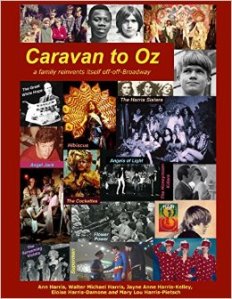 Anyone who has ever availed themselves of the Off-Off-Broadway experience in New York City, whether as a performer, a crew member or simply “one of those little people out there in the dark,” will truly sink their literary teeth into Caravan to Oz, a splendid history of one family’s journey into a most exciting period in the American theater in the Big Apple. Anyone who hasn’t ever availed themselves of the Off-Off-Broadway experience in New York City, whether as a performer, a crew member or simply “one of those little people out there in the dark,” will truly sink their literary teeth into the book all the same. And in any case, this two-hundred-and-seventy page tome laden with stunning photography, emerges as a wondrous history lesson even to those not necessarily theater-oriented. To be succinct, it’s nearly impossible to put down once begun reading. The book bears vague similarities to Edie, the smash recounting of Warhol superstar Edie Sedgwick, except that in this case the story is actually told by the subjects in question, along with additional input by such legends of the Off-Off-Broadway scene and the cultural world at large as Tim Robbins, Bob Heide, Robert Patrick, Crystal Field, Mike Figgis, Mark Lancaster, Ritsaert ten Cate, and the late Ellen Stewart.
Anyone who has ever availed themselves of the Off-Off-Broadway experience in New York City, whether as a performer, a crew member or simply “one of those little people out there in the dark,” will truly sink their literary teeth into Caravan to Oz, a splendid history of one family’s journey into a most exciting period in the American theater in the Big Apple. Anyone who hasn’t ever availed themselves of the Off-Off-Broadway experience in New York City, whether as a performer, a crew member or simply “one of those little people out there in the dark,” will truly sink their literary teeth into the book all the same. And in any case, this two-hundred-and-seventy page tome laden with stunning photography, emerges as a wondrous history lesson even to those not necessarily theater-oriented. To be succinct, it’s nearly impossible to put down once begun reading. The book bears vague similarities to Edie, the smash recounting of Warhol superstar Edie Sedgwick, except that in this case the story is actually told by the subjects in question, along with additional input by such legends of the Off-Off-Broadway scene and the cultural world at large as Tim Robbins, Bob Heide, Robert Patrick, Crystal Field, Mike Figgis, Mark Lancaster, Ritsaert ten Cate, and the late Ellen Stewart.